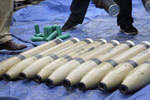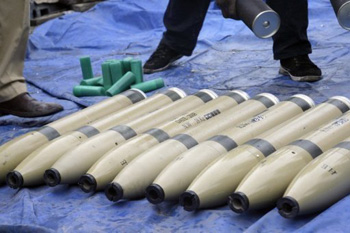 AFP: A shipment of Iranian arms discovered in Nigeria in October and destined for Gambia, to the chagrin of neighbouring Senegal, has stirred up diplomatic troubles between Tehran, Dakar and Banjul.
AFP: A shipment of Iranian arms discovered in Nigeria in October and destined for Gambia, to the chagrin of neighbouring Senegal, has stirred up diplomatic troubles between Tehran, Dakar and Banjul.
By Laurence Boutreux
 DAKAR (AFP) — A shipment of Iranian arms discovered in Nigeria in October and destined for Gambia, to the chagrin of neighbouring Senegal, has stirred up diplomatic troubles between Tehran, Dakar and Banjul.
DAKAR (AFP) — A shipment of Iranian arms discovered in Nigeria in October and destined for Gambia, to the chagrin of neighbouring Senegal, has stirred up diplomatic troubles between Tehran, Dakar and Banjul.
“There are many things I will not say on this subject. Diplomacy does not happen in broad daylight,” Senegal’s Foreign Minister Madicke Niang told reporters in Dakar last week.
The arms cache mystery, which has strained international diplomatic ties, began in July when a ship belonging to the French group CMA-CGM docked in Lagos, Nigeria, offloading containers loaded in Iran’s Bandar Abbas port.
Officially, the shipment contained construction material, but customs discovered at least 10 containers holding grenades, mortars and heavy weapons ammunition.
The trader designated by CMA-CGM as the sender, Iranian businessman Azim Aghajani, took refuge at Iran’s embassy in Abuja but was charged along with three Nigerians on November 25 for trafficking illegal arms.
According to Nigeria, Aghajani is also a member of Iran’s ideological army, the Revolutionary Guards.
Because of its controversial nuclear programme, Iran is forbidden from selling arms, under United Nations sanctions.
Iran’s former foreign minister Manouchehr Mottaki — who was fired last week while on a trip to Senegal — initially said the arms shipment was from a “private company” selling weapons to a West African country, and was only transiting through Nigeria.
Different sources identified this country as Gambia, the smallest nation on the African continent, which is wedged into Senegal.
Senegalese Foreign Minister Niang said this week the cargo documents bore the address “State House, Kanilai, Gambia” – that of Gambian President Yayha Jammeh in his native village.
Hence Dakar’s concern that “these weapons could end up in Senegal, in the hands of fighters who do not want peace”, said Niang.
He was referring to separatist rebels of the Movement of Democratic Forces of Casamance (MFDC), in Senegal’s south, which has bases in Gambia.
In recent years, Iran has fostered closer ties with both Gambia and Senegal, and President Mahmoud Ahmadinejad has made several visits to both countries.
In return for diplomatic support Tehran gave substantial financial assistance to the countries.
However the mystery arms cache has continued to have diplomatic repercussions, which began when Gambia announced on November 22 it was cutting all ties with Iran and ordered diplomats to leave the country.
On December 14, Dakar recalled its ambassador to Tehran.
“We were told that these are private Iranians (who organized the arms operation) but this cannot be done without the knowledge of an organised state,” said Niang.
The same day Gambia lashed out, categorically denying the arms were destined for its shores and accusing Senegalese President Abdoulaye Wade of harbouring “hatred for Gambia”.
“Wade is hostile,” read Friday’s headline of Gambia’s pro-government newspaper The Daily Observer.
In Dakar a lawmaker from the ruling party told local radio: “Yahya Jammeh has been caught red-handed. He is obliged to take steps to have a clean image when the Security Council investigation” takes place.
Last week, the UN Security Council accused Iran of using increasingly complex methods of weapons smuggling, using “worrying” new routes in Africa.


